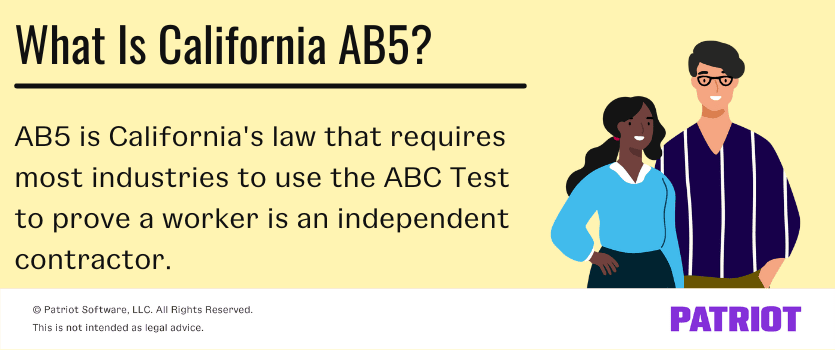In 2018, California came up with the ABC test to determine whether an employer could classify a worker as an independent contractor. And in September 2019, the court approved the new California AB 5 (Assembly Bill No. 5) to push the ABC test’s effects into motion.
The new 2019 law significantly limits the ability of California companies to classify their workers as independent contractors.
So, what does the new law do exactly? What does it mean for the California gig economy?
What is California AB 5?
AB 5 is California’s new law that requires most industries to use the ABC test to prove a worker is an independent contractor. It passed 56-15 in the California Assembly and was approved by the governor on September 18, 2019. AB 5 presumes workers are employees and puts the burden on employers to prove otherwise.

Basically, most businesses must pass the ABC test if they want to classify a worker as an independent contractor and not an employee.
About the ABC test
The ABC test was created following the Dynamex Operations West, Inc. v. Superior Court of Los Angeles County court case.
In the court case, Dynamex delivery drivers who were classified as independent contractors sued the company and won. And thus, the ABC test was born.
So, what is the ABC test that AB 5 codifies and makes law? It’s a three-step test that businesses must meet if they want to be able to classify their workers as independent contractors:
- The worker is free from the control and direction of the hirer in relation to the performance of the work, both under the contract and in fact;
- The worker performs work that is outside the usual course of the hirer’s business; AND
- The worker is customarily engaged in an independently established trade, occupation, or business of the same nature as the work performed for the hirer
Businesses must be able to prove that a worker meets all three parts of the ABC test if they want to classify them as independent contractors.
What the 2019 bill means for California businesses
So, why all the hype about this new gig economy California bill?
AB 5 is a landmark bill that will affect the worker status of millions of previously classified independent contractors—both in and out of the gig economy—in California.
Let’s define the gig economy: gig workers are freelancers or independent contractors who are not classified as employees. Although they have freedom to set their own hours, they do not receive benefits that employees do, like employer contributions to health insurance or retirement plans.
There are a few business models that rely on the use of gig workers, including Uber and Lyft. Both companies are some of the biggest names in the gig economy, and the passage of this bill is expected to alter the way they categorize their workers.
Both Uber and Lyft worked tirelessly to continue classifying workers as independent contractors. Now that the bill has passed, their fight isn’t over—they pledged $60 million to a California ballot initiative for the 2020 election to keep their workers’ independent contractor status.
California companies who are over-reliant on independent contractors will likely need to change things up, too.
Not to mention, California AB 5 has the potential to spur similar laws in other states.
Want to impress your friends at a dinner party?
Get the latest payroll news delivered straight to your inbox.
OK, OK: Independent contractor vs. employee … so what?
The distinction between independent contractor vs. employee is key to understanding what the new bill means for businesses and workers.
There are many labor laws that protect employee rights. Independent contractors are not protected under these labor laws.
Further, hiring employees is typically more expensive than hiring independent contractors. According to one article, hiring employees rather than independent contractors adds 20% – 30% to labor costs.
Here are some of the things that a worker misses out on when they are classified as an independent contractor:
- FLSA protection—minimum wage, overtime, FLSA hours worked laws
- Unemployment insurance
- Employer-sponsored benefits—e.g., health insurance, retirement plan contributions, paid time off
- Workers’ compensation insurance
- Tax contributions split between employee and employer (independent contractors pay self-employment tax as opposed to FICA tax)
- Equal employment opportunity protection
- Americans with Disabilities Act protection
Who’s affected by the bill?
Again, the AB 5 bill is expected to impact companies in the gig economy as well as businesses over-reliant on independent contractors.
Here are just a few of the industries that may be affected by California AB 5:
- Rideshare drivers
- Food-delivery workers
- App-based services
- Trucking companies
- Newspaper publishers
- Cleaning operations
What if you have a worker who you classified as an employee when they should have been an independent contractor?
According to the bill, employers cannot reclassify a worker who was an employee on January 1, 2019 to an independent contractor because of AB 5.
Who’s exempt from the bill?
Not every industry is required to use the ABC test to determine if their workers are independent contractors or employees.
These exempt companies must determine worker status using the previous standard, which was known as the “economic realities” test established in S. G. Borello & Sons, Inc. v. Department of Industrial Relations (1989).
The following are just some examples of the types of workers who are exempt from the effects of California AB 5, according to the bill:
- Certain licensed health care professionals
- Licensed insurance agents
- Registered securities broker-dealers or investment advisers
- Direct sales salespersons
- Real estate licensees
- Commercial fishermen
- Workers providing licensed barber or cosmetology services
- Other individuals performing professional services under a contract with another business (e.g., lawyers and accountants)
- Others performing services under a subcontract in the construction industry
When does the bill take effect?
Assembly Bill No. 5 takes effect starting in January 2020.
However, according to the bill, “specified Labor Code provisions of the bill apply retroactively to existing claims and actions.” The bill also states that this new law isn’t really a “new” law—instead, it explicitly defines the existing law.
So, what does this mean? Although the effects begin in 2020, Labor Code provisions relating to wage order should be applied retroactively (e.g., minimum wage).
What do the penalties look like?
Penalties for violating California AB 5 are severe.
Employers can be subject to a civil penalty ranging between $5,000 – $15,000 per violation, in addition to other penalties or fines (e.g., back wages).
If the state recognizes a pattern of violations, they can charge an employer between $10,000 – $25,000 for each violation, in addition to other penalties or fines.
Converting your independent contractors to employees
If California’s Assembly Bill 5 affects you, you need to know how to convert contractor to employee.
First, you should notify the worker that you will be changing their status to employee and how this impacts them. Explain what benefits they are eligible for.
Next, gather employee information and create a file. Have the employee fill out Form W-4, Employee’s Withholding Allowance Certificate. The purpose of a W-4 form is so that you know how much to withhold from federal income tax.
You must also verify the employee’s eligibility to work by having them fill out Form I-9, Employment Eligibility Verification. Ask them to fill out other forms that your employees normally fill out, like a state W-4, direct deposit, and health insurance benefits forms.
Don’t forget to adjust your payroll. Add the new employee to your payroll. You must now withhold and contribute taxes for the employee. And, you’ll need to withhold other deductions, like health insurance premiums and retirement plan contributions. If you use payroll software, simply input employee information (e.g., hourly or salary, wage rate, etc.).
After the end of each year, you need to give your new employee Form W-2, Wage and Tax Statement, instead of the 1099-MISC form, Miscellaneous Income.
Where can I learn more?
For more information on the new Assembly Bill 5, you can check out California’s state website.
You can also learn more by reading the bill itself on California’s Legislative Information website.
Do you need to convert an independent contractor to an employee? Then you need a reliable system to pay them. Patriot Software’s online payroll lets you run unlimited payrolls and pay independent contractors and employees at the same time. Try out a free trial today!
This is not intended as legal advice; for more information, please click here.


